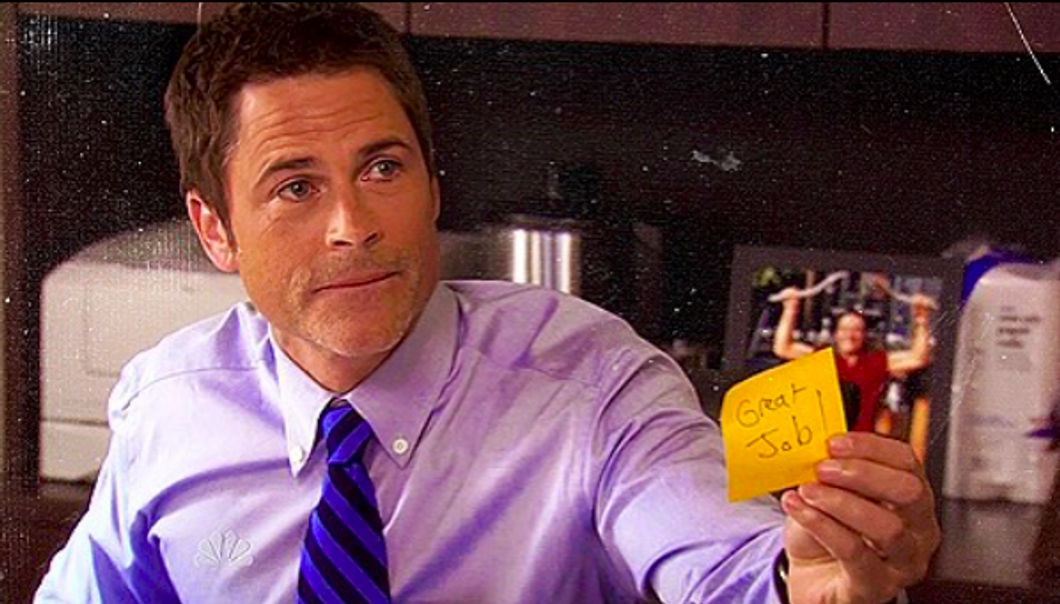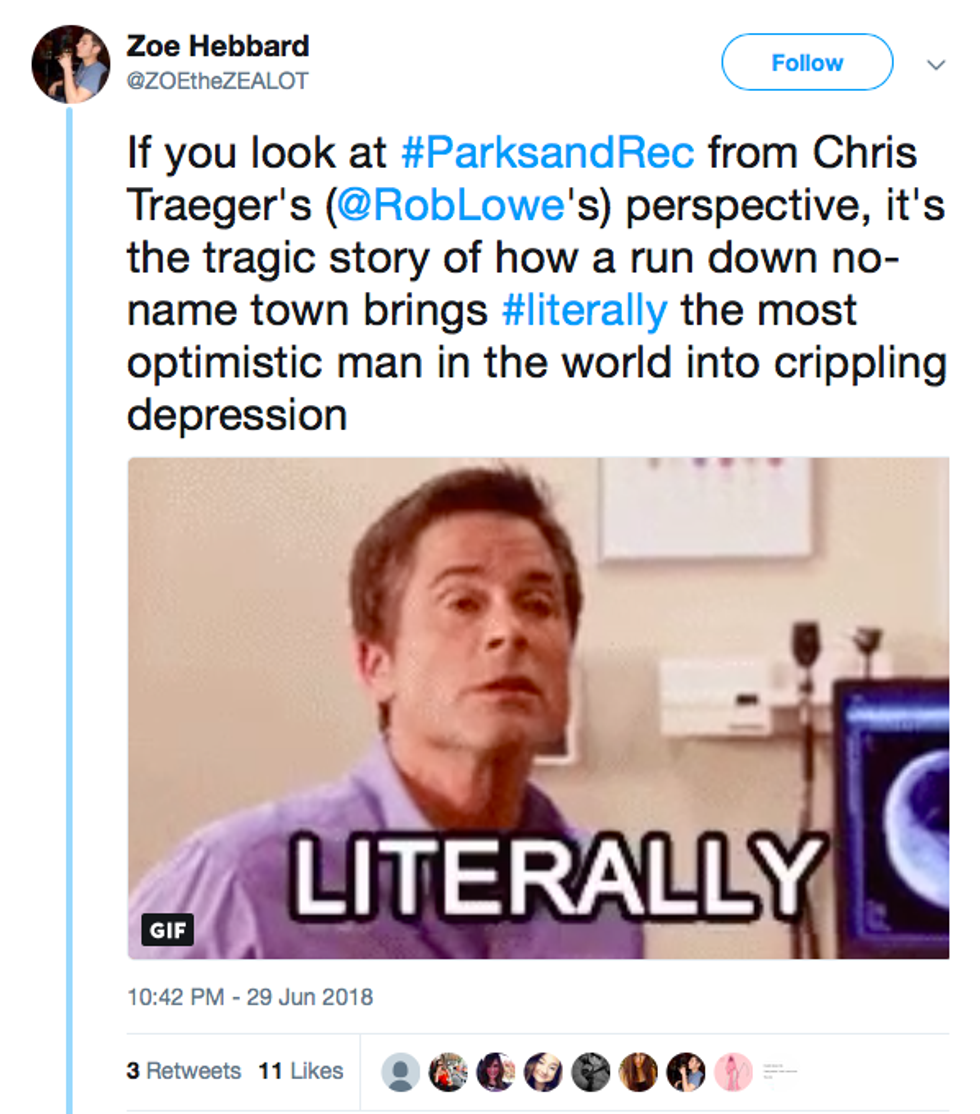I love "Parks and Recreation" as much as the next guy, maybe definitely even a little more. I love "Parks and Recreation" as much as Leslie Knope loves parks, probably. I'll suggest it to people, they'll watch the first few episodes and come back to me asking, "Really? This show?" And my standard answer is, "Watch till the end of season two and the beginning of season three and then decide what you think. Ben and Chris save the show."
Ben Wyatt and Chris Traeger are the kinds of characters that are relatable even if you aren't nerdy like Ben or athletic like Chris. Throughout each rewatch, I relate to them both in different ways. A while ago, I saw this tweet.
In my most recent rewatch, I decided to pay attention to this perspective. Before, I had brushed off the cause of his depression as a type of plot device after his breakup with Millicent Gergich in an attempt at humorous one-liners like...
However, this time, I paid attention to every circumstance and all the backstory information we get in order to pinpoint exactly when his depression began. I believe Chris was always depressed, but he didn't realize until the time of seasons four and five.
Around this time, Chris starts seeing a therapist, Dr. Richard Nygard, many times a week. He eventually forces Dr. Nygard to give him an award for the most improved patient. This journey is always in the background of the main plots and never really focused on, so it's easy to overlook as part of the jokes if you're just casually watching the show. But, if you pay attention, there are actually important lessons to be learned through Chris's journey through depression.
Chris and Ben enter the show in a time of budgetary crisis for Pawnee. Their job is to show up in a random town and literally cut as much as possible from the city budget, programs, and workforce, and then leave to move on to the next town. It's quite sad, actually, and while Ben and Chris have a good dynamic of negative versus positive or pessimism versus optimism, the job still forces them to upset some people.
Chris runs through life on the tailwinds of surviving a rare blood disorder as a child. He wants to run to the moon. He has dreams and optimism but lives his life crushing the hopes of others by cutting budgets, programs and firing people. This doesn't add up in my head, so it would not add up for him either. But, it's his life, he enjoys working with Ben and visiting new places all the time and uses these positives to outweigh the negatives. But there's something about the people in Pawnee that finally shows him he doesn't have to cut budgets his whole life, that he can cultivate relationships with others and not constantly move around from town to town. Eventually, he decides to stay.
At the beginning of season five, when Chris is beginning to realize he is depressed, he has an existential crisis while helping Andy train for the police academy. Andy has trouble getting motivated, so Chris asks him why he wants to run. After a pep talk, Andy declares that he's running for April, that he's running for love. Offhanded, he asks, "What do you run for again, Chris?" To which Chris has the answer, "Nothing, no one." He collapses. He thinks its a health scare, but after a visit to the hospital, concludes he is physically fine. In true Andy fashion, he suggests Chris find a doctor for the mind.
Thus begins Chris's time in therapy. Throughout this time, he is always supported by friends. Sure, many characters make offhand jokes about Dr. Nygard, but they are more to this elusive doctor's expense than at Chris's depression. All of Chris's friends are happy to see him improve. They are also happy to help him through the process when all his emotions are raw. During Leslie and Ben's engagement party, April and Andy spend the whole time in the back room consoling Chris by talking about bugs and Dave Matthews Band.
The most important thing I realized was that the root of Chris's depression was not just the girl issues with Millicent or Shauna Malwae-Tweep or even Ann Perkins. His depression was rooted much deeper and impacted these aspects of his life. Just look at his relationship with Ann before and after therapy. Before he was so controlling of the relationship and he was bad at communication. After therapy, their relationship was based on good communication, he let Ann be her own person and was able to fall back in love with her with the best interest of her and their baby in mind. Ann also had her own issues to work through in between their relationships. The second time around, they both seemed happier and more in love due to the progress each had made in their mental health.
In season six, when Andy is in England and April is in Pawnee, Chris sees April drifting into depression. She has always been a darker, edgier character, but Chris was able to recognize the difference from her typical April characteristics and a potential state of depression due to his own experiences. He realized he was depressed after seeing how much Andy and April cared for each other and realizing he did not have a passion for anything in his life, so when Chris helped April, it was almost like coming full circle.
The lessons we can learn from Chris Traeger are just as important as everything Leslie Knope rants about. Get help if you need it. Seek out therapy or even just the ear of a friend or family member if you don't have access to therapy. Talking through your problems will help. Surround yourself with people you care about. Chris eventually found Ann again, but before this, he was content with the friends he made in Pawnee. People like Ben, Ron, Andy, Tom, and even Jerry grounded him in the present and helped him find his passion for life. You can always get back to your old self if that's what you're looking for—Chris was positive and healthy in his beginning of the show and was able to find his optimistic self again by the end.
Pawnee did not cause Chris's depression, but it did help him realize he needed to address it. In the end, Pawnee helped him work through his emotions and come out a stronger person.
Giphy

























